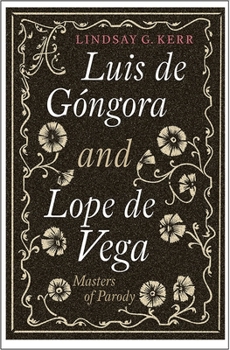Luis de Góngora and Lope de Vega: Masters of Parody
Traces the processes and paradoxes at work in the late parodic poetry of Luis de G ngora and Lope de Vega, illuminating correlations and connections. Co-Winner of the 2014 Publication Prize awarded by the Association of Hispanists of Great Britain and Ireland Kerr traces the processes and paradoxes at work in the late parodic poetry of Luis de G ngora and Lope de Vega, illuminating the correlations and connections between two poets who have more often than not been presented as enemies.The analysis follows the parallel development of the complex parodic genre through G ngora's late mythological parody, from his 1589 Hero and Leander romance through to his culminating parody, La f bula de P ramo y Tisbe (1618) and Lope de Vega's alter ego Tom de Burguillos, whose anthology, Rimas humanas y divinas del licenciado Tom de Burguillos, was published a year before Lope's death, in 1634. Working from the premise that parody provides a Derridean suppl ment to exhausted, dominant genres (e.g. pastoral, lyric, epic), this study asks: what do these texts achieve by their supplementarity, and how do they achieve it?, and, the overarching question, why do these erudite poets turn to parody in an age of decline? Lindsay Kerr received her PhDin Spanish at Queen's University Belfast.
Format:Hardcover
Language:English
ISBN:1855663171
ISBN13:9781855663176
Release Date:August 2017
Publisher:Tamesis Books
Length:219 Pages
Weight:1.07 lbs.
Dimensions:0.6" x 6.1" x 9.2"
Customer Reviews
0 rating





